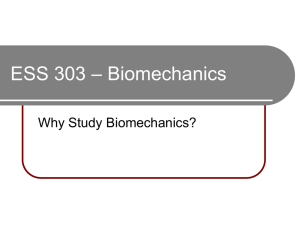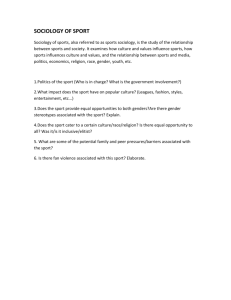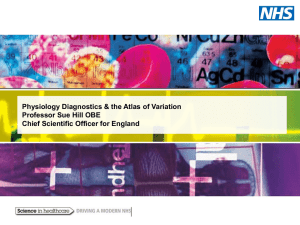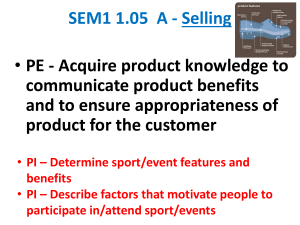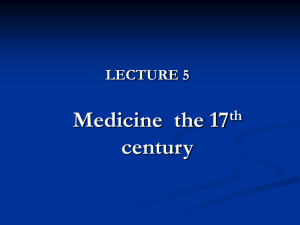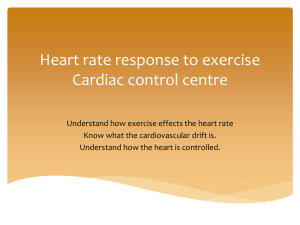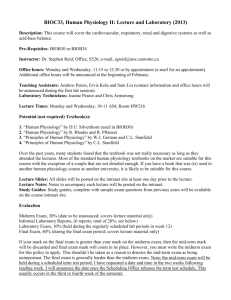Reading List - Loughborough University
advertisement
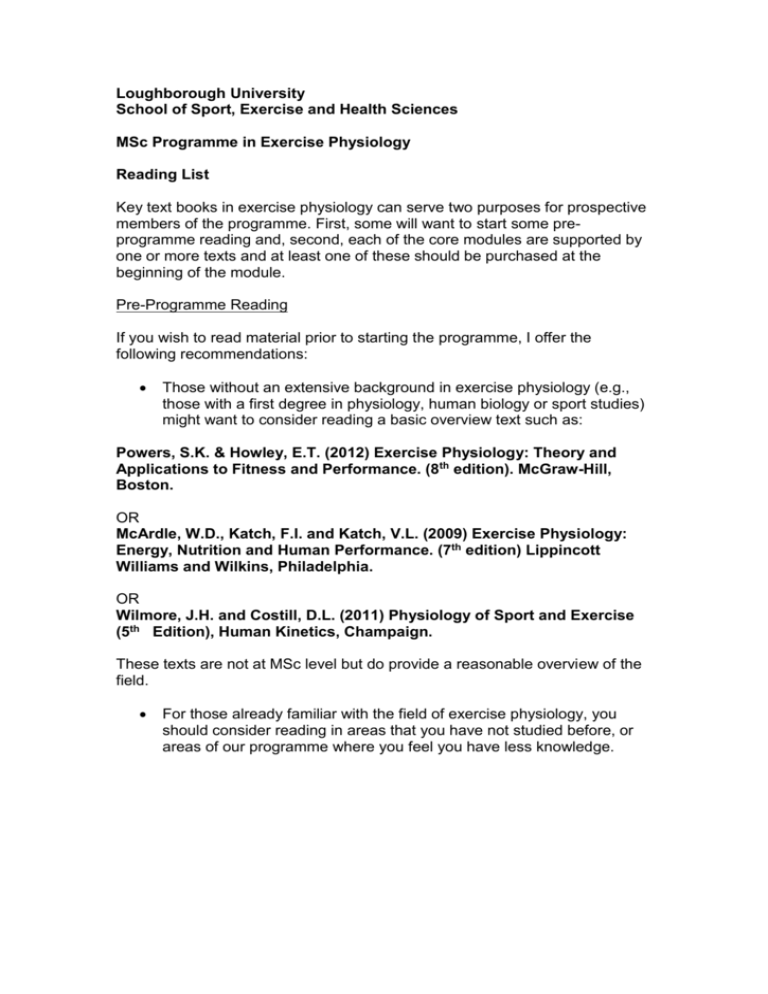
Loughborough University School of Sport, Exercise and Health Sciences MSc Programme in Exercise Physiology Reading List Key text books in exercise physiology can serve two purposes for prospective members of the programme. First, some will want to start some preprogramme reading and, second, each of the core modules are supported by one or more texts and at least one of these should be purchased at the beginning of the module. Pre-Programme Reading If you wish to read material prior to starting the programme, I offer the following recommendations: Those without an extensive background in exercise physiology (e.g., those with a first degree in physiology, human biology or sport studies) might want to consider reading a basic overview text such as: Powers, S.K. & Howley, E.T. (2012) Exercise Physiology: Theory and Applications to Fitness and Performance. (8th edition). McGraw-Hill, Boston. OR McArdle, W.D., Katch, F.I. and Katch, V.L. (2009) Exercise Physiology: Energy, Nutrition and Human Performance. (7th edition) Lippincott Williams and Wilkins, Philadelphia. OR Wilmore, J.H. and Costill, D.L. (2011) Physiology of Sport and Exercise (5th Edition), Human Kinetics, Champaign. These texts are not at MSc level but do provide a reasonable overview of the field. For those already familiar with the field of exercise physiology, you should consider reading in areas that you have not studied before, or areas of our programme where you feel you have less knowledge. Key texts for each module (highly recommended texts in bold font): Physiology of Exercise and Sport (TERM 1; 15 credits) Hardman A.E. and Stensel, D.J. (2009). Physical Activity and Health. The Evidence Explained. (2nd Edition) Routledge Taylor and Francis, London. Wilmore, J.H. and Costill, D.L. (2011). Physiology of Sport and Exercise (5th edition), Human Kinetics, Champaign. McArdle, W.D., Katch, F.I. and Katch, V.L. (2009). Exercise Physiology: Energy, Nutrition and Human Performance. (7th edition) Lippincott Williams and Wilkins, Philadelphia. Powers, S.K. and Howley, E.T. (2012). Exercise Physiology (8th edition). McGraw Hill, Boston. Maughan, R.J. and Gleeson, M. (2010). The Biochemical Basis of Sports Performance (2nd edition). Oxford University Press, Oxford. Hargreaves, M. and Spriet, L.L. (editors) (2006). Exercise Metabolism. (2 nd edition). Human Kinetics, Champaign, IL. Whipp, B.J. and Sargeant, A.J. (1999). Physiological Determinants of Exercise Tolerance in Humans. The Physiological Society, Studies in physiology No. 4, Portland Press. Jeukendrup, A.E. and Gleeson, M. (2010). Sports Nutrition: An Introduction to Energy Production and Performance (2nd edition). Human Kinetics, Champaign, IL. Sport and Exercise Nutrition (TERM 1; 15 credits) Maughan, R.J. and Burke, L.M. (2002). Sports Nutrition. IOC Handbook Series. Blackwell, Oxford. Maughan, R.J. (editor) (2000). Nutrition in Sport; IOC Encyclopaedia Series. Blackwells, Oxford. Burke, L.M. (2007). Practical Sports Nutrition. Human Kinetics. Burke, L.M. and Deakin, V. (2006). Clinical Sports Nutrition (3rd edition). McGraw Hill. Jeukendrup, A.E. and Gleeson, M. (2010). Sports Nutrition: An Introduction to Energy Production and Performance (2nd edition). Human Kinetics, Champaign, IL. Maughan, R.J., Burke, L.M. and Coyle, E.F. (editors) (2004). Food, Nutrition and Sports Performance II. Routledge, London. Maughan, R.J. and Gleeson, M. (2010). The Biochemical Basis of Sports Performance (2nd edition). Oxford University Press, Oxford. Barasi, M.E. (2003). Human Nutrition - A Health Perspective. (2nd edition). Arnold, London. Mann J. and Truswell, A.S. (2007). Essentials of Human Nutrition. (3rd Edition) Oxford University Press, Oxford. McArdle, W.D., Katch, F.I. and Katch, V.L. (2005). Sports and Exercise Nutrition. (2nd edition). Lippincott, Philadelphia. Exercise and Immunology (TERM 1; 15 credits) Gleeson, M. (editor) (2005). Immune Function in Sport and Exercise. Advances in Sport and Exercise Science Series. Edinburgh: Elsevier ISBN 0-443-10118-3 Widmaier, E., Raff, H., Strang, K. Vander's Human Physiology (12th edition), McGraw Hill, Boston. Nieman, D.C. and Pederson, B.K. (2000). Nutrition and Exercise Immunology; CRC Press, Boca Taton, Florida. Delves, P.J., Martin, S.J., Burton D.R., Roitt I.M. (2006), Roitt’s Essential Immunology (11th edition); Blackwell Science, Oxford., Chapter 18. Vocational Skills in Exercise Physiology (TERM 1; 15 credits) The Sport and Exercise Scientist (official BASES publication) BASES World (official BASES publication) BASES Guideline documents and Careers Guide (www.bases.org.uk) MacDougall, J.D., Wenger, H.A. and Green, H.J.(1991) Physiological testing of the High-Performance Athlete. Human Kinetics, Champaign, IL. Young, M. and Fricker, P. (2000) Medical and nutritional issues for the travelling athlete. In: Burke, L.M. and Deakin, V. (editors) Clinical Sports Nutrition. (2nd edition). McGraw Hill, Roseville. pp 702-709 Laboratory Techniques in Human Exercise Physiology (TERM 2; 30 credits) Eston R. and Reilly, T. (2001). Kinanthropometry and Exercise Physiology Laboratory Manual. (2nd edition), Routledge, London. Heyward, V.H. (1991). Advanced Fitness Assessment and Exercise Prescription; Champaign, IL: Human Kinetics ACSM's Guidelines for Exercise Testing and Prescription; (2005); 7th Ed; Baltimore: Lippincott, Williams and Wilkins. Research Methods in Exercise Physiology (TERM 2; 15 credits) Field, A. (2009). Discovering Statistics Using SPSS for Windows (3rd edition), SAGE. This is the key text for the quantitative statistics covered in this module. Thomas, J.R., Nelson, J.K. and Silverman (2005). Research Methods in Physical Activity (5th edition), Human Kinetics. This is the key text for the research design and methods covered in this module. Fallowfield, J.L., Hale, B.J. and Wilkinson, D.M. (2005). Using Statistics in Sport and Exercise Science Research, Lotus. Ntoumanis, N. (2001). A Step-by-Step Guide to SPSS for Sport and Exercise Studies, Routledge. Vincent, W.J. (2005). Statistics in Kinesiology (3rd edition), Human Kinetics. Current Research in Exercise Physiology (TERM 2; 15 credits) Same list as for Physiology of Exercise and Sport. For this module there is extensive reference to recent journal articles. I look forward to meeting you in September and wish you enjoyment and success on the programme. Welcome to Loughborough!

